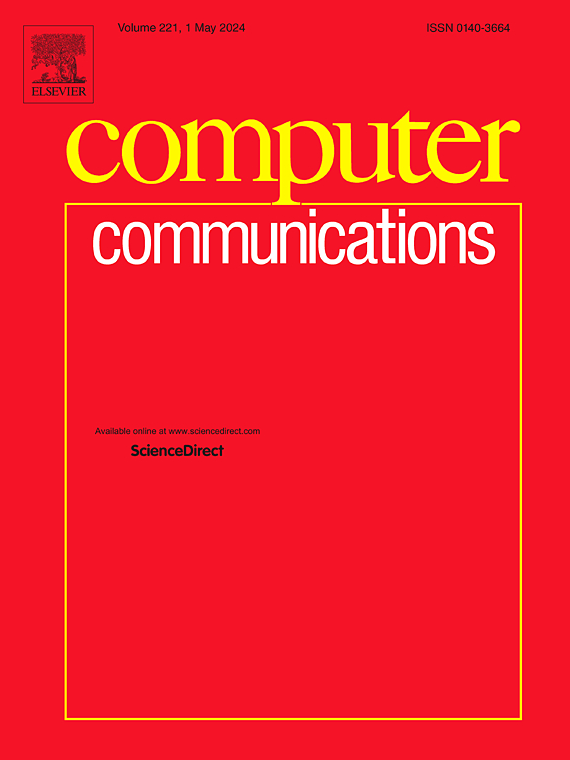Maritime monitoring through LoRaWAN: Resilient decentralised mesh networks for enhanced data transmission
IF 4.3
3区 计算机科学
Q1 COMPUTER SCIENCE, INFORMATION SYSTEMS
引用次数: 0
Abstract
Resilient communication networks from ocean-deployed buoys are crucial for maritime applications. However, wireless data transmission in these environments faces significant challenges due to limited buoy battery capacity, harsh weather conditions, and potential interference from maritime vessels. LoRaWAN technology, known for its low power consumption and long-range communication capabilities, presents a promising solution. Nevertheless, the standard LoRaWAN framework lacks native support for multi-hop routing, which is essential for enhancing network efficiency by relaying data between buoys. This paper introduces two novel multi-hop routing protocols designed for resilient LoRaWAN mesh networks in maritime environments. The first, Opportunistic Smart Routing over a Decentralised LoRaWAN Mesh (OSR-DLM), employs a cross-layer design with a hybrid routing strategy and balanced metric selection. The second, Beacon-Forwarding LoRaWAN with Channel-Aware Path Selection (BF-LoRaCAPS), maintains continuous device awareness using a scheduling mechanism and integrates the OSR-DLM strategy for further optimisation. We evaluate these protocols through extensive simulations that model the detrimental effects of severe weather on data transmission, validated by analysing varied parameter settings in massive Maritime of Things (MoT) scenarios. Key performance metrics, including packet delivery ratio, end-to-end latency, throughput, and traffic intensity for each hop-ratio, are analysed. The results show the superiority of both OSR-DLM and BF-LoRaCAPS over conventional Geographic Routing Protocol (GRP) variants under realistic marine channel conditions. Notably, BF-LoRaCAPS exhibits superior network coverage and resilience, outperforming both OSR-DLM and GRP variants, albeit with slightly increased latency.
通过LoRaWAN进行海上监测:增强数据传输的弹性分散网状网络
海洋部署浮标的弹性通信网络对于海事应用至关重要。然而,由于浮标电池容量有限、恶劣天气条件和海上船只的潜在干扰,这些环境中的无线数据传输面临着重大挑战。LoRaWAN技术以其低功耗和远程通信能力而闻名,提出了一个有前途的解决方案。然而,标准的LoRaWAN框架缺乏对多跳路由的本地支持,这对于通过在浮标之间中继数据来提高网络效率至关重要。本文介绍了两种针对海洋环境下弹性LoRaWAN网状网络设计的新型多跳路由协议。第一种是分布式LoRaWAN Mesh (OSR-DLM)上的机会主义智能路由,采用混合路由策略和平衡度量选择的跨层设计。第二种是具有信道感知路径选择(BF-LoRaCAPS)的信标转发LoRaWAN,它使用调度机制保持连续的设备感知,并集成OSR-DLM策略以进行进一步优化。我们通过广泛的模拟来评估这些协议,这些模拟模拟了恶劣天气对数据传输的不利影响,并通过分析大规模海事物联网(MoT)场景中的各种参数设置来验证。分析了关键性能指标,包括数据包传送率、端到端延迟、吞吐量和每个跳比的流量强度。结果表明,在实际的海洋航道条件下,OSR-DLM和BF-LoRaCAPS都优于传统的地理路由协议(GRP)变体。值得注意的是,BF-LoRaCAPS表现出卓越的网络覆盖和弹性,优于OSR-DLM和GRP变体,尽管延迟略有增加。
本文章由计算机程序翻译,如有差异,请以英文原文为准。
求助全文
约1分钟内获得全文
求助全文
来源期刊

Computer Communications
工程技术-电信学
CiteScore
14.10
自引率
5.00%
发文量
397
审稿时长
66 days
期刊介绍:
Computer and Communications networks are key infrastructures of the information society with high socio-economic value as they contribute to the correct operations of many critical services (from healthcare to finance and transportation). Internet is the core of today''s computer-communication infrastructures. This has transformed the Internet, from a robust network for data transfer between computers, to a global, content-rich, communication and information system where contents are increasingly generated by the users, and distributed according to human social relations. Next-generation network technologies, architectures and protocols are therefore required to overcome the limitations of the legacy Internet and add new capabilities and services. The future Internet should be ubiquitous, secure, resilient, and closer to human communication paradigms.
Computer Communications is a peer-reviewed international journal that publishes high-quality scientific articles (both theory and practice) and survey papers covering all aspects of future computer communication networks (on all layers, except the physical layer), with a special attention to the evolution of the Internet architecture, protocols, services, and applications.
 求助内容:
求助内容: 应助结果提醒方式:
应助结果提醒方式:


